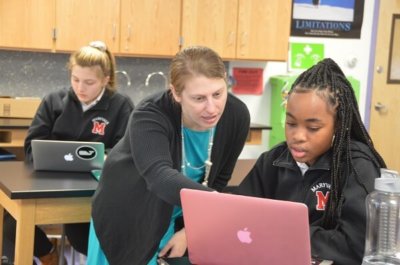Ms. Emily Waugh, a 2003 graduate of Maryvale, joined the faculty at Maryvale Preparatory School five years ago. She is the quintessential example of Maryvale’s impact on her as a woman and learner. Maryvale’s mission is to instill a love of learning and a sense of confidence and compassion into its graduates. Emily has a genuine and innate love of teaching and sharing with others. Her goal is to instill that energy in students, inspiring them to be curious learners and giving people. Emily’s personal vocation is to guide her students to reach their God-given potential.
Emily teaches science to a diverse age group. As an instructor, Emily employs a differentiated approach to her classes to purposefully relate scientific concepts to real life. She approaches teaching as a learner, recognizing that some students need visual, oral or written cues while others need the value of hands-on learning. An example of Emily’s slant is realized in her Grade 8 Life Science class’s study of fungus. Students initially did research on different types of fungus – categorizing classes and characteristics, taking notes to share in class with others. The girls then dissected fungi, identifying parts both similar and unique to each species. As a culmination and reinforcement, a video was created by students using Adobe Spark that explained the various parts and distinction of fungus.
Technology, in Emily’s view, is critical to effective instruction. Her classroom is equipped with a Promethean Board which she uses for visual instruction, to manipulate data, save and post for later reference. Her Environmental Science class is conducted completely online. Emily’s no-paper approach serves as an example of the responsibility we each have to a ‘green’ environment. Digital tools employed in her include Padlet and Flipgrid, both interactive platforms for reinforcement of teaching.
As a freshmen advisor and class dean, she pointedly works with her advisees on class placement, academic progress and needed support. The larger group discussions include social, academic and emotional impediments, directing the girls to solve problems and self-advocate as well as addressing individual students’ needs.

